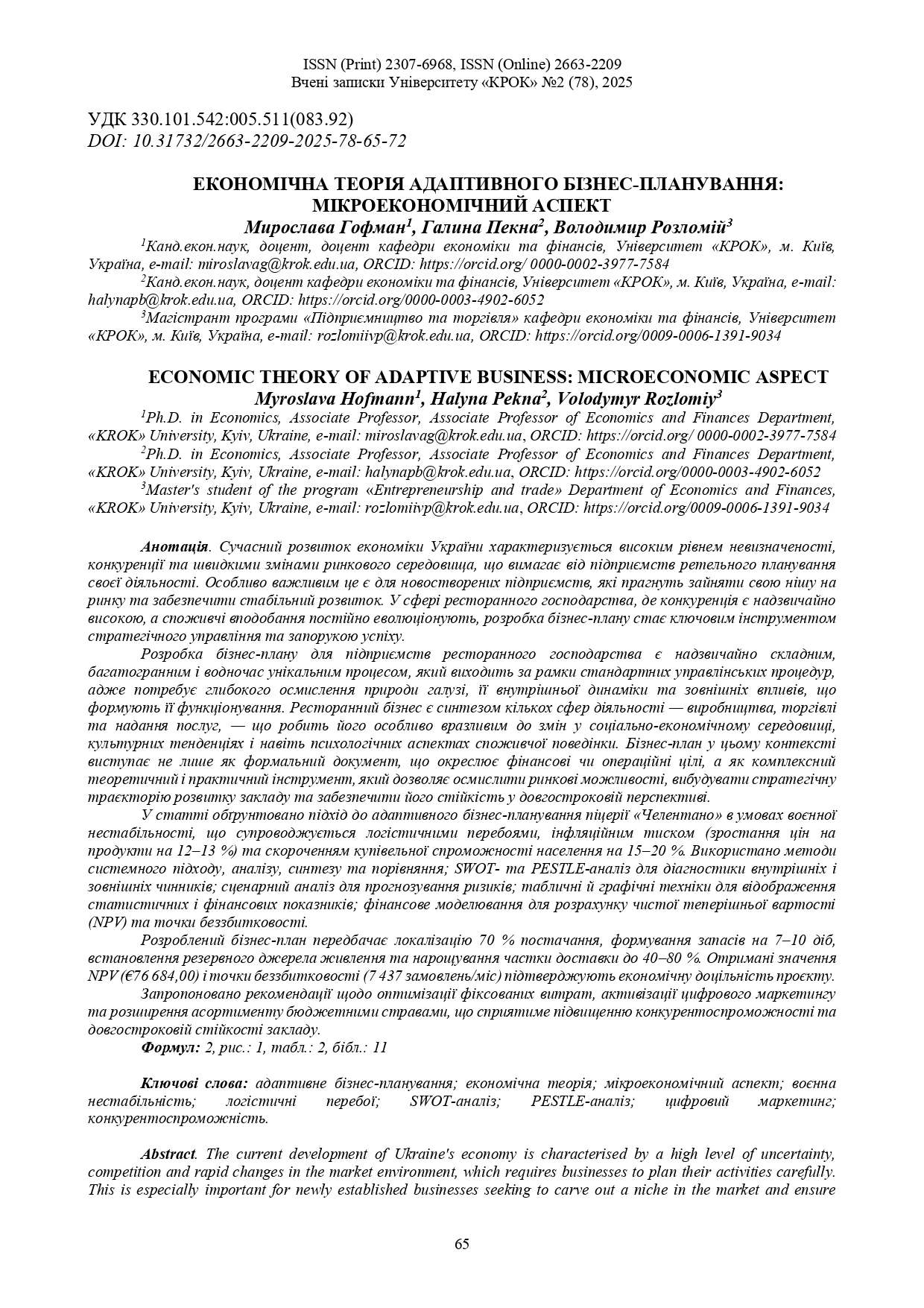ECONOMIC THEORY OF ADAPTIVE BUSINESS: MICROECONOMIC ASPECT
DOI:
https://doi.org/10.31732/2663-2209-2025-78-65-72Keywords:
adaptive business planning;, economic theory;, microeconomic aspect;, military instability;, logistical disruptions;, SWOT analysis;, PESTLE analysis;, digital marketing;, competitiveness;Abstract
The current development of Ukraine's economy is characterised by a high level of uncertainty, competition and rapid changes in the market environment, which requires businesses to plan their activities carefully. This is especially important for newly established businesses seeking to carve out a niche in the market and ensure sustainable development. In the restaurant industry, where competition is fierce and consumer preferences are constantly evolving, developing a business plan becomes a key strategic management tool and a key to success.
Developing a business plan for restaurant businesses is an extremely complex, multifaceted, and at the same time unique process that goes beyond standard management procedures, as it requires a deep understanding of the nature of the industry, its internal dynamics, and the external influences that shape its functioning. The restaurant business is a synthesis of several areas of activity — production, trade, and service provision — which makes it particularly vulnerable to changes in the socio-economic environment, cultural trends, and even psychological aspects of consumer behavior. In this context, the business plan acts not only as a formal document outlining financial or operational goals, but as a comprehensive theoretical and practical tool that allows you to understand market opportunities, build a strategic trajectory of the institution's development and ensure its sustainability in the long term.
This article substantiates an approach to adaptive business planning for the Celentano pizzeria under conditions of military instability, characterized by logistical disruptions, inflationary pressure (a 12–13 % increase in food prices), and a 15–20 % reduction in consumer purchasing power. The study employs methods of systems approach, analysis, synthesis, and comparison; SWOT and PESTLE analyses to diagnose internal and external factors; scenario analysis to forecast risks; tabular and graphical techniques to present statistical and financial indicators; and financial modeling to calculate net present value (NPV) and the breakeven point.
The proposed business plan includes localizing 70 % of supply sources, building inventory for 7–10 days, installing a backup power system, and increasing the delivery share to 40–80 %. The resulting NPV (€76,684.30) and breakeven point (7,437 orders per month) confirm the project’s economic feasibility.
Recommendations are made to optimize fixed costs, intensify digital marketing, and expand the menu with budget-friendly dishes, thereby enhancing the enterprise’s competitiveness and long-term resilience.
Downloads
References
Дугиєнко, Н., & Дугиєнко, О. (2023). Роль фінансів у бізнес-плануванні готельно-ресторанних та туристичних підприємств. Економіка і суспільство, Вип. 47, Стаття 16. https://economyandsociety.in.ua/index.php/journal/article/view/2107
Литвиненко, О. О., & Гайченко, І. В. (2022). Інноваційні моделі управління ресторанним бізнесом в умовах кризи. Бізнес Інформ, 8, 102–109.
Бондаренко, Т. В. (2020). Методи оцінки ефективності інвестицій у ресторанний сектор. Економіка та держава, 10, 65–72. http://www.irbis-nbuv.gov.ua/cgi-bin/irbis_nbuv/cgiirbis_64.exe?I21DBN=LINK&P21DBN=UJRN&Z21ID=&S21REF=10&S21CNR=20&S21STN=1&S21FMT=ASP_meta&C21COM=S&2_S21P03=FILA=&2_S21STR=ecde_2019_2_8
Banyeva, I. & Velychko, O. (2020). Prospects of post-war reconstruction of the hotel and restaurant industry in Ukraine. Market Infrastructure, 67, 46–50. http://market-infr.od.ua/journals/2022/67_2022/10.pdf
Brych, V. Ya., Kushniruk, H. O., Rutynskyi, M. Y., & Susol, N. Ya. (2020). Organization of Hotel and Restaurant Business: Manual. Київ: Центральноукраїнський національний технічний університет. Отримано 15 листопада 2024 з
Пекна, Г., & Гофман, М. (2025). Мікроекономічні показники діагностики конкурентного середовища на ринку нерухомості. Вчені записки Університету «КРОК», 1(77), 54–65. https://doi.org/10.31732/2663-2209-2025-77-54-65
Андрєєва, В. & Гофман, М. (2024). Оцінка збитків від пошкодження майна внаслідок військової агресії російської федерації в Україні. Вчені записки Університету «КРОК», 1(73), 20–27. https://doi.org/10.31732/2663-2209-2024-73-20-27
Ananieva, O., Hofmann, M. (2022). The peculiarities of the research tools in the analysis of enterprise economics in a state of uncertainty. Economics of uncertainty:content, assessment, regulation:a collective monograph. Kyiv:KROK University, 129 – 145. https://doi.org/10.36690/EUCER-129-145
Kovalchenko, K., & Sosyn, V. (2024). Prospects and development strategies of the restaurant industry at the regional level. Journal of Education, Health and Sport, 57, 217–222.
Рутинський, М. Й. (2024). Trends and strategies in the development of Ukraine’s hotel and restaurant business under crisis conditions. Матеріали Всеукраїнської науково-практичної конференції «Актуальні проблеми економіки та підприємництва в умовах викликів і загроз», Кропивницький, 123–130. https://www.researchgate.net/publication/369123456_Trends_and_strategies_in_the_development_of_Ukraine_hotel_and_restaurant_business_under_crisis_conditions
Лозинська М. (2024). Дитячі зони як фактор конкурентоспроможності ресторанів. Гостинність. №1. С. 28–34. URL: http://nbuv.gov.ua/UJRN/gost_2024_1_5 (дата звернення: 08.03.2025)

Downloads
Published
How to Cite
Issue
Section
License

This work is licensed under a Creative Commons Attribution-NonCommercial 4.0 International License.

